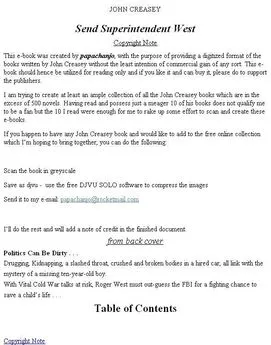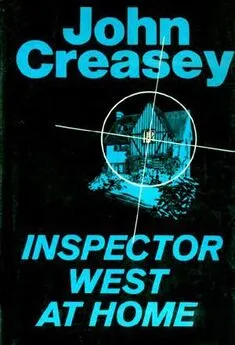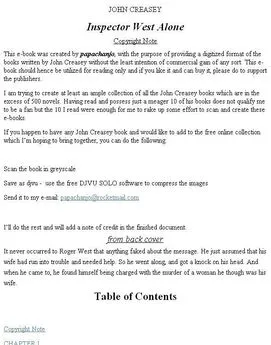John Creasey - Send Superintendent West
- Название:Send Superintendent West
- Автор:
- Жанр:
- Издательство:неизвестно
- Год:неизвестен
- ISBN:нет данных
- Рейтинг:
- Избранное:Добавить в избранное
-
Отзывы:
-
Ваша оценка:
John Creasey - Send Superintendent West краткое содержание
Send Superintendent West - читать онлайн бесплатно полную версию (весь текст целиком)
Интервал:
Закладка:
Nothing in his voice reflected the surge of excitement he felt, and Sloan schooled himself to show no unusual interest. Roger went to the slab which was being used as a table and looked through the oddments already on it. A sodden handkerchief, keys and a small knife on a chain, a small reel of Scotch tape, three credit cards, common in the United States, little known in England. They showed the name of Ed Scammel.
He took them to the searcher.
Where did you find these?”
“Funny thing,” the man said. “You’d expect them to be in his wallet, wouldn’t you? They weren’t, though. The lining of his pocket was torn, these were inside the lining. I was just checking the unlikely places first.”
“Good,” said Roger. “Sergeant — what’s your name?”
“Day, sir.”
“Day, don’t tell anyone this man was probably an American. Don’t tell the others in the office, just have it on record he’s not identified yet but there’s nothing unusual about him. Clear?”
There was a chorus of “yes, sirs”.
“Thanks.” Roger examined everything taken from the dead man’s pockets, but nothing seemed to offer help.
The door opened, and Wirral came in, lowering his head to miss the lintel. Roger and Sloan went across to him. For a few moments they stayed near the door, while the others continued to work, shooting curious glances towards them.
“Raincoat took a taxi, George got another,” he said. “You satisfied him, I should think. I’ll have word from Stebber’s Garage in ten minutes or so.”
“Fine,” said Roger, and smiled, trying to relax; but he couldn’t.
He had, in fact, been unable to relax since the moment he had heard that the child had been kidnapped. The kidnapping had tied a knot in his vitals, and everything else had drawn the knot tighter; even Lissa Meredith. Now, he wanted evidence of an association between the American found in the Thames with his throat slashed, the missing child, the Austin A70 with the American driver, and the Buick which had been seen at London Airport. Kidnapping was always vicious, standing out wickedly among crimes, the work of criminals without feeling, ruthless, deadly. Like the murder of the man whose credit cards named him as Ed Scammel, of Elizabeth, New Jersey. Behind all that was the atmosphere Marino and Lissa had created. From being relaxed to a point of boredom on his way to the Yard that morning, he had become as taut as a wire rope: a thin wire rope.
“Fine,” he repeated. “Wirral, I’ve asked these chaps not to mention that the dead man is American. That really matters, for an hour or so. Fix it, will you?” He hardly gave Wirral time to nod. “Will you have everything found in his pockets packed up and taken to the Yard right away? Marked for me, to go into Hardy’s office.” That was the one way he could make sure that no one blundered.
“Yes,” said Wirral. “What else?”
Roger grinned.
“How soon can I have a picture of the chap?”
“I’ll have one rushed through,” Wirral promised.
“Get plenty done, we might need ‘em soon,” Roger said.
Ten minutes later, they were back at the police station. The message from Stebber’s Garage had arrived: no one had been seen hanging about the garage, it had been just another day, except for Peel’s inquiries about the Austin A70.
The wet print came up quicker than Roger had expected. He put it between a fold of blotting-paper before going out.
Stebber’s was just another garage, small, untidy, reeking of petrol and oil, with two youths and a mechanic in dirty overalls, one at a bench, two with their faces buried in the engine of a fifteen-year-old car. There was the usual hoist on its thick, greased pole; the steady beat of an engine charging accumulators and batteries made a monotonous song. Stebber was a little plump man in a stained grey suit, who came hurrying from a small office, glass walled on three sides. He had a pencil behind his right ear, grubby fat cheeks creased in a smile that was probably more anxious than it looked. He rubbed his hands together.
“What can I do for you, gents?”
Roger showed his card. “About this American and the Austin A70 — did he give you an address?”
“No, sir, he didn’t,” said Stebber, and now the anxiety showed through. “Not that there was any need,” he added defensively. “Just wanted the job done quick. There’s no law that says —”
“Had you seen the man before?”
“No, and I ain’t seen him since. I’ve answered all these questions once, and —”
“I’m just checking up,” Roger said.
“Stolen, was it?”
“We’d like to find it,” Roger temporized. “Any special characteristics, did you notice?”
“No, I didn’t, but Bert, that’s the mechanic who did the job, wasn’t in when the other cop — the other ‘tec come, he noticed something. Not certain, mind you, but the Austin A70 might have been fitted with false number plates, some time.”
“Only might ? Where’s that mechanic?”
“Bert!” bellowed Stebber.
Bert was in dingy white overalls and a new trilby hat with a few oily fingermarks on the brim. He had seen cars fitted to take two or three number plates — examined them for the police, he explained — and this Austin might have been fitted for that, but there had been only one number plate.
“Did you give the other officer the number?” asked Roger.
“Certainly,” Stebber said. “Help the police in every way I can, that’s my motto.”
“Keep to it By the way,” Roger said, taking the fold of blotting paper from under his arm, and unfolding it, “have either of you ever seen this chap?”
They stared at the photograph.
“Why, that’s the Yank!” Stebber exclaimed. “That’s him! Ain’t it, Bert?”
“You couldn’t mistake a face like that, could you?” Bert asked.
• • •
Armed with a dozen prints of the American’s photograph, Roger drove to Barnes police station, where Peel was collecting more garage reports. They had the names of three garages where an American with an A70 had called for petrol.
The photograph was recognized at all of them.
“So the car’s home is about here somewhere,” Detective Inspector Peel said. He was another, younger, Sloan; fresh complexion, blue eyes, short fair hair.
“We want it, and we want it in a hurry,” Roger said. “And we don’t want the owner to know we’ve traced it I’m going to the Yard, to get everything laid oh. You’ll be in charge down here.”
“We’ll find it,” Peel said.
Sloan was at the Yard, with fresh news; the registration number given by Stebber’s garage for the A70 was a false one, there was no such number registered anywhere in England. He had sent six Yard men down to Barnes straight away, but they had found nothing. Even the man in the raincoat had shaken off Wirral’s George.
• • •
At half past ten the next morning, Roger finished a telephone talk with Marino, and Lissa. There was no news of importance about the Shawns; no real change in the condition of either.
At ten forty-five, Peel called through from Barnes.
“I think we’ve got something, sir. Can you come down?”
“As fast as I can get there,” promised Roger. “Found either of the cars?”
“I haven’t seen it, but the Austin is kept by a woman named Norwood — Mrs Clarice Norwood — in a house called “Rest”, on the riverside near Chiswick Steps. The dead American has been seen to drive it to her house. She left for Paris, forty-eight hours ago, and the place has been empty since, according to the tradespeople.”
“Have it checked, fast, but leave the garage to me,” said Roger. “Wait a minute! The Norwood woman — what can you tell me about her?”
Peel said: “She’s a gay widow. Used to have a lot of men friends, but recently she’s been faithful to one.”
“Name?”
“I’ve only heard about this in the last hour,” Peel protested.
“Put the other men on to tracing Mrs Norwood and trying to get something about the regular boyfriend,” Roger ordered. “This could be very important indeed.”
8
GISSING
THE brick house was small, pleasant, secluded, and the garden ran down to the sluggish Thames. Across the river were the dark-red walls of factories; above and below the house were jetties, warehouses and hustle. Here was an oasis, protected by beech trees in full green dress on three sides, by the river on the fourth. There was a small lawn, with a few rose bushes standing in freshly turned beds, surrounded by closely growing shrubs. A wooden jetty stood out from the river bank, a white-painted dinghy tied alongside, swaying gently. Most of the windows faced the river; those looking on to the beech trees were small.
It was after twelve o’clock noon. The house had been visited by a Yard man, posing as an Electricity Board official, but no one had answered his knock.
Across the river, at the window of a warehouse, Sloan was standing with a pair of powerful binoculars. Two other detectives also watched, too far away to be of help if help were needed, but near enough to observe all comings and goings to the house, which had no number, just the name: “Rest”. The porch was covered with pale-green tiles, the front door and all the woodwork was of light brown, green tiles covered the gabled roof.
The garage was at the back of the house.
Roger drove along the narrow road leading to “Rest”, passed the beech trees and felt cut off from everyone as he drew up to the white garage doors.
There was ample room for the Austin, which was bigger than most made in England. The electric light and back daylight shone on the glossy black bodywork, the sleek lines. Roger opened the driving-door, sat at the wheel, looked in all the pockets and the glove compartment. Then he got busy, searching for prints. It took him five minutes to make sure that the car had been cleaned up thoroughly. Later, there could be an inch-by-inch examination; now, he had more urgent work to do.
He went out of the garage, turned his own car and approached the house. The only sound was the lapping of water nearby, the chirping of birds. From the house, silence. He studied the back door, and tried the handle. It was locked.
He walked round the house on crazy paving, neatly laid, no trap for careless feet The lapping of the water grew louder. The sun shone bright on the rippling river. He reached the front door, and knocked sharply; after a pause he knocked again, then rang the bell.
He glanced over his shoulder.
No one was in sight; no one had been in sight since he had left Peel two hundred yards away where this little private road led off the main highway. Peel had wanted to come with him; would have followed, if he hadn’t received strict instructions to stay put. Had that been safe? Was he safe? Did the trees conceal watchers, men who would slit another’s throat?
Roger tried the handle, but this door was also locked. He walked to the nearest window; examined it, and discovered that it would not be easy to force. If all the windows were the same, he might have to break one in order to get inside. He had no search warrant, but Hardy would cover him for that
Retracing his steps round the house, he tried a skeleton key in the back door; after a lot of twisting and turning, it worked, but he found that the door was bolted. Close by, he found a small window with a fastener he could reach with a long nail file. In five minutes he climbed into the kitchen. There was no sound. He shut the window and walked slowly across to a door leading into a square hall; there was no passage, only three other rooms, two on the right, one on the left; and a flight of stairs, carpeted from wall to banisters; the hall floor was also covered by a fitted carpet. His footsteps were muffled by dark-fawn pile. He went straight to the front door, unbolted and opened it and stood for a moment on the porch, not waving, but making sure that Sloan had time to see him. Then he closed the door and went inside again.
Читать дальшеИнтервал:
Закладка:










